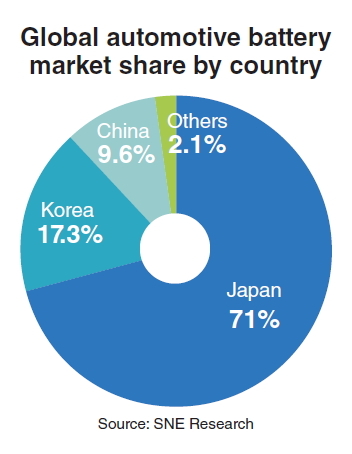Despite the growing influence of Korean automotive battery makers like LG Chem, Japanese manufacturers dominated the sector last year, taking more than 70 percent market share, a local energy market research firm said.
“A survey of batteries used for electric cars registered in 25 countries found that Japanese companies swept the market with a 71 percent share, followed by Korean makers with 17.3 percent,’’ said Yoo Shin-jae, vice president of SNE Research.
The SNE conducted the research on three types of electric vehicles ― pure EVs, hybrid EVs and plug-in hybrid EVs.

By brand, Panasonic, which has supplied its battery products to Tesla and Audi, topped with a 30.5 percent market share in 2014. Two other Japanese makers ― AESC and PEVE ― were placed second and third, with 17.7 percent and 15.1 percent, respectively.
LG Chem, the nation’s top automotive battery maker, was the fourth largest, with a 10.8 percent share. Samsung SDI and SK Innovation were placed seventh and eighth.
“The survey result, however, didn’t reflect the recent deals that the top three Korean EV battery makers sealed as it will take two or three years for global EV carmakers to load their battery packs on their products,’’ Yoo said, adding that Korean influence will rise a few years later.
In its latest deal, LG Chem signed a contract with Daimler to supply its lithium-ion batteries to the German automaker’s new range of Smart EV, which will be launched in 2016. The company’s battery products will be loaded on EVs of global carmakers like General Motors’ Chevrolet, Renault, Ford and Audi.
Samsung SDI took over the battery pack business division of Magna, a global car parts maker, last month, in its effort to expand its automotive battery business.
“As Korean EV battery makers continue to drive market expansion overseas, we expect their market share will soar up to 30 to 40 percent in two or three years,’’ Yoo said.
He added that Japanese rivals could lose their ground in the segment as their business portfolio heavily depends on hybrid EVs.
By Seo Jee-yeon (jyseo@heraldcorp.com)

